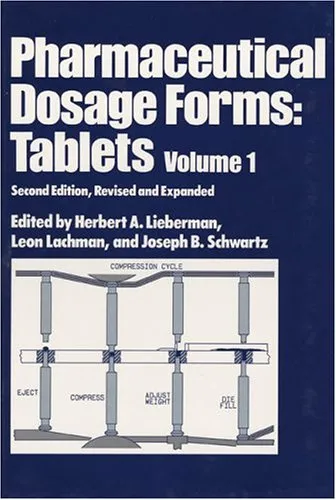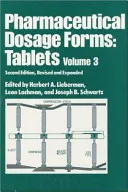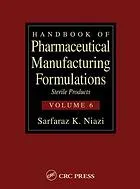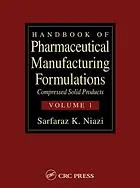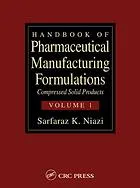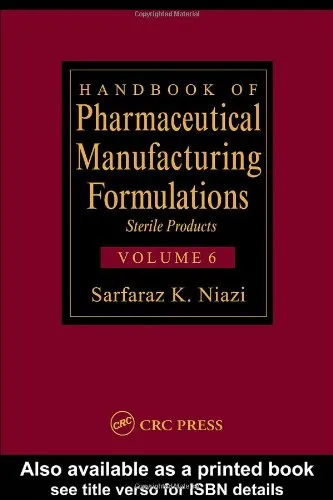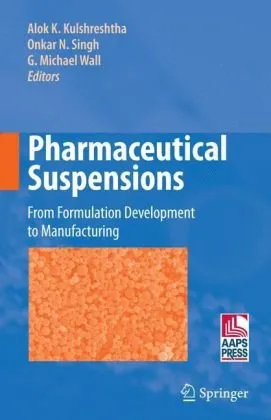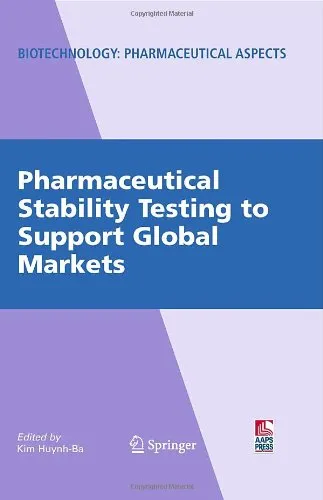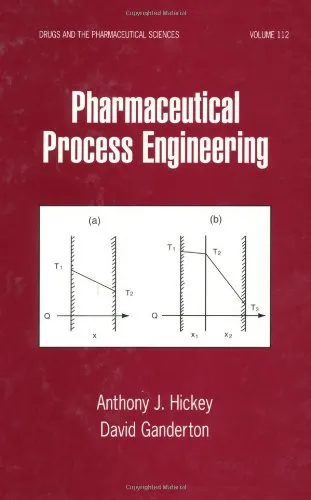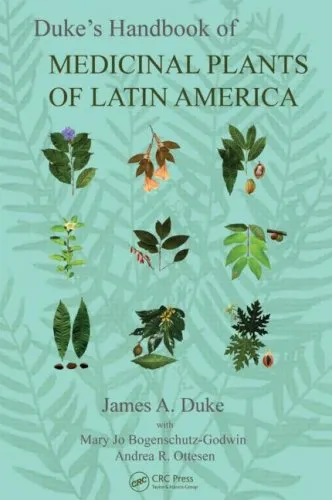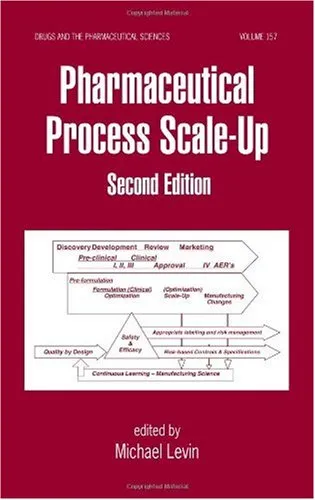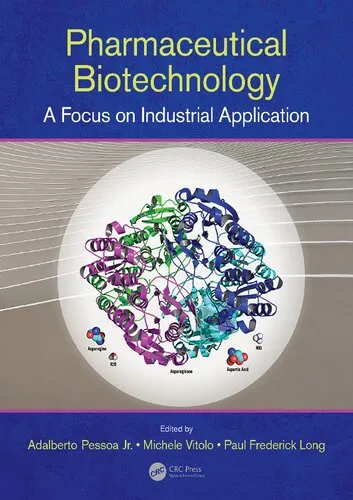Pharmaceutical Manufacturing Handbook Production and Processes
4.0
بر اساس نظر کاربران

شما میتونید سوالاتتون در باره کتاب رو از هوش مصنوعیش بعد از ورود بپرسید
هر دانلود یا پرسش از هوش مصنوعی 2 امتیاز لازم دارد، برای بدست آوردن امتیاز رایگان، به صفحه ی راهنمای امتیازات سر بزنید و یک سری کار ارزشمند انجام بدینکتاب های مرتبط:
معرفی کتاب «Pharmaceutical Manufacturing Handbook: Production and Processes»
کتاب «Pharmaceutical Manufacturing Handbook: Production and Processes» نوشته شین کاکس گد (Shayne Cox Gad)، یک منبع جامع و ارزشمند در زمینه فرآیندها، فناوریها و تولیدات صنعت داروسازی به شمار میآید. این کتاب به طور خاص به کسانی که در زمینه توسعه دارو، مهندسی فرآیند و تولید مشغول به فعالیت هستند، کمک میکند تا با جزئیات فرآیندها و استانداردهای این صنعت پیچیده آشنا شوند. محتوای این کتاب نه تنها برای متخصصان حاضر در صنعت، بلکه بهویژه برای مدیران تولید و محققانی که به دنبال منابع معتبر هستند، بسیار کاربردی است.
خلاصهای از کتاب
کتاب به بررسی همهجانبه فرآیندهای تولید در صنعت داروسازی میپردازد. از توسعه محصول (Product Development) تا تولید انبوه (Mass Production) و از تضمین کیفیت (Quality Assurance) تا تدوین دستورالعملهای (Standard Operating Procedures) SOP، تمامی ابعاد تولید دارو به دقت تشریح شده است. همچنین، کتاب شامل بخشی اختصاصی برای بحث درباره الزامات رگولاتوری، GMP (Good Manufacturing Practices)، فرآیندهای کنترل کیفیت (Quality Control) و Environmental Health & Safety میباشد. این اثر همچنین به موارد خاصی مانند انتقال فناوری (Technology Transfer) در شرکتهای داروسازی و استفاده از Automation در خط تولید میپردازد.
نکات کلیدی
- آشنایی جامع با فرآیندهای تولید و کنترل کیفیت در صنعت داروسازی.
- تمرکز بر اهمیت GMP و انطباق با استانداردهای جهانی.
- بررسی کاربردهای Automation و Data Integrity در فرآیند تولید دارو.
- توضیح نحوه مدیریت پروژهها و انتقال فناوری در مقیاسهای مختلف.
- توجه به مسائل زیستمحیطی و ایمنی کارکنان در خطوط تولید.
نقلقولهای معروف از کتاب
“The success of pharmaceutical manufacturing depends on controlled processes and rigorous adherence to standards.”
“Quality isn’t just a guideline in manufacturing, it’s a lifeline that saves lives.”
چرا این کتاب اهمیت دارد؟
کتاب «Pharmaceutical Manufacturing Handbook» به دلیل جامعیت و دقت در پوشش موضوعات مختلف مرتبط با تولید دارو، اهمیت ویژهای دارد. این منبع ارزشمند میتواند به بهبود فرآیندهای تولید، کاهش هزینهها، و ارتقاء کیفیت محصولات دارویی کمک نماید. همچنین مطالعه این کتاب برای درک بهتر استانداردهای جهانی، تطابق با الزامات سازمانهای نظارتی مانند FDA و EMA و طراحی خط تولید موثر، حیاتی است. در دنیای پیچیده صنعت داروسازی که کوچکترین خطا ممکن است جان انسانها را در معرض خطر قرار دهد، دانش حاصل از این کتاب میتواند به سازمانها در ارائه محصولات ایمن و با کیفیت کمک کند.
Introduction to the 'Pharmaceutical Manufacturing Handbook: Production and Processes'
The pharmaceutical industry is among the most complex, strictly regulated, and rapidly evolving sectors in the world. To help professionals, academics, and enthusiasts navigate this challenging field, the "Pharmaceutical Manufacturing Handbook: Production and Processes" serves as a comprehensive guide to this multifaceted industry. Authored by Shayne Cox Gad, the book is a definitive resource for understanding the intricate workings of pharmaceutical manufacturing, executed with precision and best practices.
Spanning an extensive range of topics, this handbook addresses every critical aspect of pharmaceutical production and its associated processes, including formulation development, materials science, manufacturing protocols, process scalability, regulatory compliance, and monitoring systems. This resource has been designed to meet the needs of a wide audience—from industry veterans seeking a detailed reference to beginners looking to build a strong foundational understanding of pharmaceutical manufacturing.
What makes this book incredibly valuable is the clarity with which technical details are presented, offering a balanced synthesis of authoritative insights and practical guidance. Now, let’s explore the key facets of this book and understand why it remains an indispensable guide in the field of pharmaceutical manufacturing.
Detailed Summary of the Book
The "Pharmaceutical Manufacturing Handbook: Production and Processes" is divided into several sections, each carefully curated to cover vital topics such as manufacturing strategies, regulatory challenges, and industry-best methodologies.
This book begins with an introduction to the fundamental principles of pharmaceutical production, offering a strong theoretical base before delving into the key applications. Sections address the challenges involved in scaling laboratory formulations into full-scale production, emphasizing precision and reproducibility. Furthermore, comprehensive chapters cover materials science—including excipients and drug ingredients—ensuring that readers understand the interaction between components that directly impact a product's safety and efficacy.
One of the book’s strengths is its focus on regulatory requirements and compliance, providing insights that ensure manufacturers navigate the stringent legal environment effectively. Special attention is given to Good Manufacturing Practices (GMP), validation protocols, risk management, and quality control strategies, allowing companies to meet international regulatory standards efficiently. With multidisciplinary discussions ranging from aseptic manufacturing and lyophilization to advanced process controls, the book provides a robust framework for problem-solving and innovation in pharmaceutical manufacturing.
This is not merely a manual but a dynamic tool filled with real-world examples, case studies, and contributions from industry experts. Whether addressing environmental considerations, contingency measures, or cost-efficiency in formulation development, the book equips its readers with best practices they can immediately apply.
Key Takeaways
Here are some of the most invaluable lessons readers can take away from this handbook:
- Comprehensive understanding of pharmaceutical manufacturing processes, from formulation development to final production.
- Expert guidance on ensuring compliance with Good Manufacturing Practices (GMP) and other global regulatory standards.
- Proven strategies for addressing and overcoming common production challenges, such as scalability and stability issues.
- Detailed focus on quality assurance, validation protocols, and risk management frameworks.
- Insights into advanced techniques, including continuous manufacturing, automation, and process analytical technology (PAT).
Famous Quotes from the Book
The "Pharmaceutical Manufacturing Handbook" offers profound insights, many of which resonate deeply with professionals in the industry. Here are some notable quotes:
“Pharmaceutical manufacturing is not just a science of producing compounds; it is an art of precision, dedication, and strict adherence to quality.”
“Innovation in pharmaceutical production is a constant pursuit of excellence, where every process must align with the ultimate goal: ensuring patient safety.”
“Regulatory guidelines are not obstacles but frameworks that guide the industry toward ethical, sustainable, and reliable pharmaceutical practices.”
Why This Book Matters
Pharmaceutical manufacturing is a critical industry that directly affects lives across the globe. This book steps into that responsibility by delivering its readers the required tools, knowledge, and strategies to excel in the field. Here’s why this book truly matters:
This handbook offers not only theoretical knowledge but actionable guidance for overcoming challenges in pharmaceutical production—such as adapting to new technologies or ensuring compliance with increasingly stringent regulatory requirements. It serves as a reference for professionals, acting as a bridge between academic understanding and practical application.
The pharmaceutical industry is vital to global healthcare, developing the medications that save lives every day. By focusing on quality, consistency, safety, and efficiency, this book contributes to a higher standard of excellence across the industry. It empowers manufacturers to produce safe and effective products at scale, which are essential to improving worldwide healthcare outcomes.
For anyone working in or studying pharmaceutical production, this handbook represents a key resource that aligns with the best practices and cutting-edge advancements in the field. It stands not only as a testament to the complex nature of pharmaceutical manufacturing but also as an accessible and reliable source of solutions to those complexities.
دانلود رایگان مستقیم
شما میتونید سوالاتتون در باره کتاب رو از هوش مصنوعیش بعد از ورود بپرسید
دسترسی به کتابها از طریق پلتفرمهای قانونی و کتابخانههای عمومی نه تنها از حقوق نویسندگان و ناشران حمایت میکند، بلکه به پایداری فرهنگ کتابخوانی نیز کمک میرساند. پیش از دانلود، لحظهای به بررسی این گزینهها فکر کنید.
این کتاب رو در پلتفرم های دیگه ببینید
WorldCat به شما کمک میکنه تا کتاب ها رو در کتابخانه های سراسر دنیا پیدا کنید
امتیازها، نظرات تخصصی و صحبت ها درباره کتاب را در Goodreads ببینید
کتابهای کمیاب یا دست دوم را در AbeBooks پیدا کنید و بخرید
1663
بازدید4.0
امتیاز0
نظر98%
رضایتنظرات:
4.0
بر اساس 0 نظر کاربران
Questions & Answers
Ask questions about this book or help others by answering
No questions yet. Be the first to ask!


